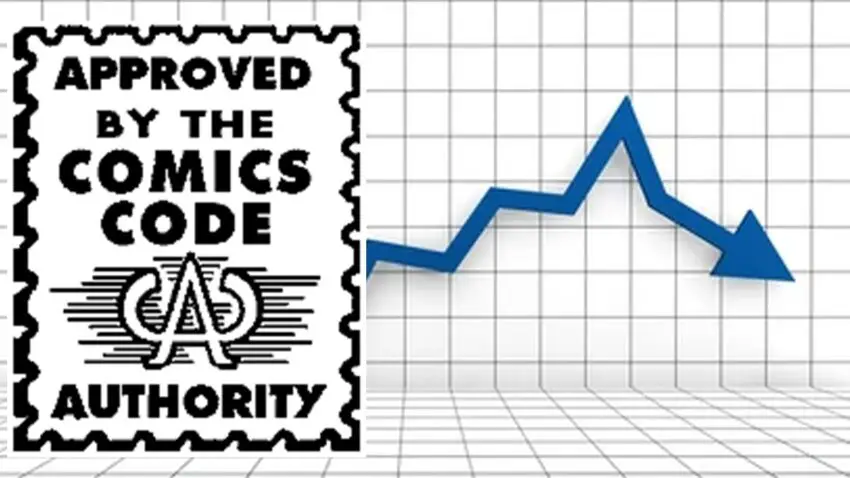Are you a fan of comic books? In the 1950s, the Comics Code Authority was imposed on the industry to regulate content. But what happened to this once influential body? In this article, we’ll examine the rise and fall of the Comics Code Authority.

The Rise of the Comics Code Authority
The establishment of the Comics Code Authority (CCA) is a pivotal moment in comics code authority history. In response to public concern over comic book content, publishers united to create a self-regulatory body. The CCA would evaluate and approve comics for publication based on its rules and guidelines.
Under the guidance of Dr. Frederic Wertham and his book “Seduction of the Innocent“, comics became labeled as a corrupting influence on youth. This led to strict censorship under the CCA, with drastic comic book content changes across all mainstream publishers.
Despite criticisms and challenges from underground comics and independent publishers, the CCA remained intact until the 21st century when alternative rating systems emerged. Today, its legacy represents the impact societal norms and values can have on censorship in comics, as well as the influence of comic book distribution channels.
One notable anecdote is that of publisher William Gaines, who stood up against censorship during Senate hearings by refusing to distribute sadomasochistic or exploitative content in his comics. His efforts paved the way for more diverse storytelling in comics.
The Comics Code Authority left the comic book industry reeling, like Superman after a kryptonite smoothie.
The Effects of the Comics Code Authority on the Comic Book Industry
The Comics Code Authority shaped the comic book industry by controlling its content for over five decades. The censorship imposed led to significant changes in the way publishers produced comics, which then affected their distribution channels. Hence, the regulation had far-reaching consequences that went beyond mere periodical publications.
While the formation of the Comics Code Authority certainly prevented blatant sexual and violent content in comics, it also severely limited the imagination of comic book writers and artists. The forceful imposition of censorship also disrupted independent comic publishers who often refused to comply with such mandates. However, in response to societal changes brought about by events such as the Vietnam War protests and civil rights movements, alternative rating systems were gradually introduced from the 1970s onwards that aimed to promote artistic freedom while keeping with society’s norms and values.
The new rating system challenged the existing comics code authority rules by making room for underground comics and diversity in storytelling perspectives. In turn, these alternative channels gave rise to an independent movement that countered mainstream superhero comics with sharper critique and edgier themes.
Pro Tip: Regulation can stifle creativity if not revisited regularly. During periods of societal unrest, traditional approaches may not work; hence moderation is key to avoiding significant disruption whilst promoting innovation.
The Comics Code Authority’s demise was like a comic book villain getting defeated by their own convoluted plan.
The Decline of the Comics Code Authority
The Comics Code Authority declined due to factors such as:
- the myth of comic book content contributing to Juvenile delinquency
- the emergence of underground comics and alternative rating systems
Despite its censorship legacy, independent comic publishers emerged with less-restricted content that matched society’s changing norms and values. Comic book distribution channels also evolved towards greater diversity, reducing the impact of the Comics Code Authority.
Interestingly, underground comic books were initially beyond the reach of censorship attempts by the Comics Code Authority in 1954. However, societal changes led to a backlash against excessive freedom, resulting in criminal charges against several important players, including publisher Lawrence Lipton.
(Source: “Comic Book Nation” by Bradford W. Wright)
Even though the Comics Code Authority is no longer in existence, its impact can still be felt in the industry today – kind of like a bad joke that just won’t go away.
The Legacy of the Comics Code Authority
The influence of the Comics Code Authority (CCA) on the comic book industry and its legacy have been significant. The CCA, created in 1954, aimed to regulate the content and imagery of comic books for fear that they could corrupt young minds. However, this censorship was controversial and had a dramatic effect on comics code authority history.
Despite being initially hailed as a way to protect society’s norms and values, the CCA received backlash from independent comic publishers for restricting creativity and depicting alternative viewpoints. Moreover, it led to a decline in readership for mainstream comics that lacked provocative or challenging storytelling.
Even though the CCA lost its authority in 2011 after publishing companies developed their own rating systems, it still influences perceptions of comic book content changes today. The censors contended that certain themes were too mature for younger audiences. However, such restrictions denied people access to diverse perspectives.
Alternative rating systems have re-established underground comic publishers who can explore complex themes without fearing censorship by an external body like CCA. As a result of this shift, “mature” graphic novels are flourishing because they can address complex issues more effectively.
To persevere as a legitimate source of media entertainment censorship in comics must align with societal values while providing opportunities for creators to generate artistic works across all genres. This balance will ensure that comic book distribution channels remain healthy as we move forward into an increasingly inclusive future where stories can be shared openly across geographies and cultures.
We hope you found this article interesting. Come back for more reviews, previews, and opinions on comics, and don’t forget to follow us on social media:
If you’re interested in this creator’s works, remember to let your Local Comic Shop know to find more of their work for you. They would appreciate the call, and so would we.
Click here to find your Local Comic Shop: www.ComicShopLocator.com
As an Amazon Associate, we earn revenue from qualifying purchases to help fund this site. Links to Blu-Rays, DVDs, Books, Movies, and more contained in this article are affiliate links. Please consider purchasing if you find something interesting, and thank you for your support.

